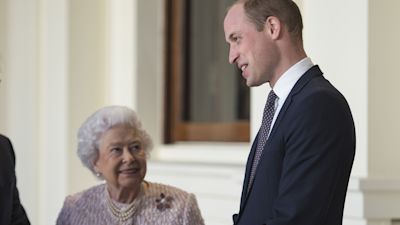What is the Duchy of Cornwall and how much will Prince William earn from it?

The role of Duke of Cornwall has now been handed to Prince William following the accession of King Charles III.
It means Prince William is now responsible for the Duchy of Cornwall estate.
According to the Duchy's 1337 charter, the Duke of Cornwall is always the heir to the throne so upon the death of Queen Elizabeth II, the whole estate was passed down to Prince William.
William and Kate have also become the new Prince and Princess of Wales and the Duke and Duchess of Rothesay in Scotland.
Additionally, William inherited the Scottish titles the Earl of Carrick, Baron of Renfrew, Lord of the Isles and Prince and Great Steward of Scotland.
The Duchy owns 7,571 hectares of land in Cornwall and the estate is worth approximately £1 billion. This is what Prince William will take on as the new Duke of Cornwall.
What is the Duchy of Cornwall?
The Duchy of Cornwall was created in 1337 by Edward III for his son and heir, Prince Edward. A charter ruled that each future Duke of Cornwall would be the eldest surviving son of the Monarch and the heir to the throne.
The estate and its operations have evolved in line with the views and ambitions of each Duke of Cornwall, and it is the Duchy's responsibility to manage the estate in a way that is "sustainable, financially viable and of meaningful value to the local community".
Like King Charles and Queen Consort Camilla did during their time as Duke and Duchess, Prince William and Princess Kate Middleton are likely to make regular visits to the Duchy to provide support to local organisations, businesses and communities as part of their new roles.
The former Duke of Cornwall also aimed to "nurture and improve the estate" to pass it on to future generations in a stronger and better condition.
How much will Prince William earn from the Duchy of Cornwall?
The Duchy of Cornwall website states that The Prince of Wales is not entitled to the proceeds or profit on the sale of capital assets, and only receives the annual income which they generate.
As the 25th Duke of Cornwall, William is entitled to the multimillion-pound annual net surplus from the Duchy of Cornwall landed estate.
According to the official Prince of Wales website, The Duchy currently provides an annual income of £21million which The Prince uses to support himself, his children and their families as well as his philanthropic work, which raises more than £100million annually for a variety of good causes. The Prince voluntarily pays income tax on all revenue from the estate.
The income will cover the cost of both his public and private life.
Prince Charles has paid Income Tax voluntarily on the surplus of the Duchy of Cornwall - after the official expenditure has been deducted at the highest rate - which was 45 per cent in 2016-17, resulting in a total of £4.8million (including an element of VAT).
How big is the Duchy of Cornwall and how is it managed?
The Duchy of Cornwall covers 52,449 hectares of land across 20 counties, mostly in the South West. It includes farms, property, forests, rivers, quarries, monuments and coastline.
Surprisingly, much of the Duchy of Cornwall isn't actually in Cornwall. Most of the rest is spread around other parts of southern England. For example, the Duchy includes Poundbury - a town in Dorset - and Highgrove, King Charles' home in Gloucestershire.
Estuaries, such as the Tamar, Helford and Camel, as well as coastal foreshore around Cornwall and the Isles of Scilly are now also in William's hands. He will also own 900 hectares of woodland in Cornwall, such as Greenscombe Wood in east Cornwall.
The Duchy even has holiday cottages and 17 ancient monuments, including Launceston Castle.
It is the Duchy's responsibility to manage this estate in a way that is sustainable, financially viable and of meaningful value to the local community.
As heir to throne, which he automatically became on the death of the Queen on Thursday, William’s royal duties will intensify in his roles and in support of his father and as he prepares for his own reign one day.
Charles recently paid tribute to “our new Prince and Princess of Wales”, saying they would “continue to inspire and lead our national conversations, helping to bring the marginal to the centre ground where vital help can be given”.
Statement from the Duchy of Cornwall on the Queen's passing
"It is with great sadness that we observe the demise of HM Queen Elizabeth II. HM Queen Elizabeth II took a keen interest in the Duchy of Cornwall during both the reign of her father HM King George VI and in the early years of her own reign.
"Together with HRH The Duke of Edinburgh, she made a number of visits across the Duchy estate and attended Council meetings until her son, HRH The Prince of Wales came of age as Duke of Cornwall.
"The passing of HM Queen Elizabeth II and the succession of HM King Charles III marks the transition of the title of the Duke of Cornwall to HRH The Duke of Cambridge.
"As such the estate is in safe hands. It is right at this time, to recognise the huge changes made by our 24th Duke of Cornwall over 70 years. His Majesty passes the estate on much improved."